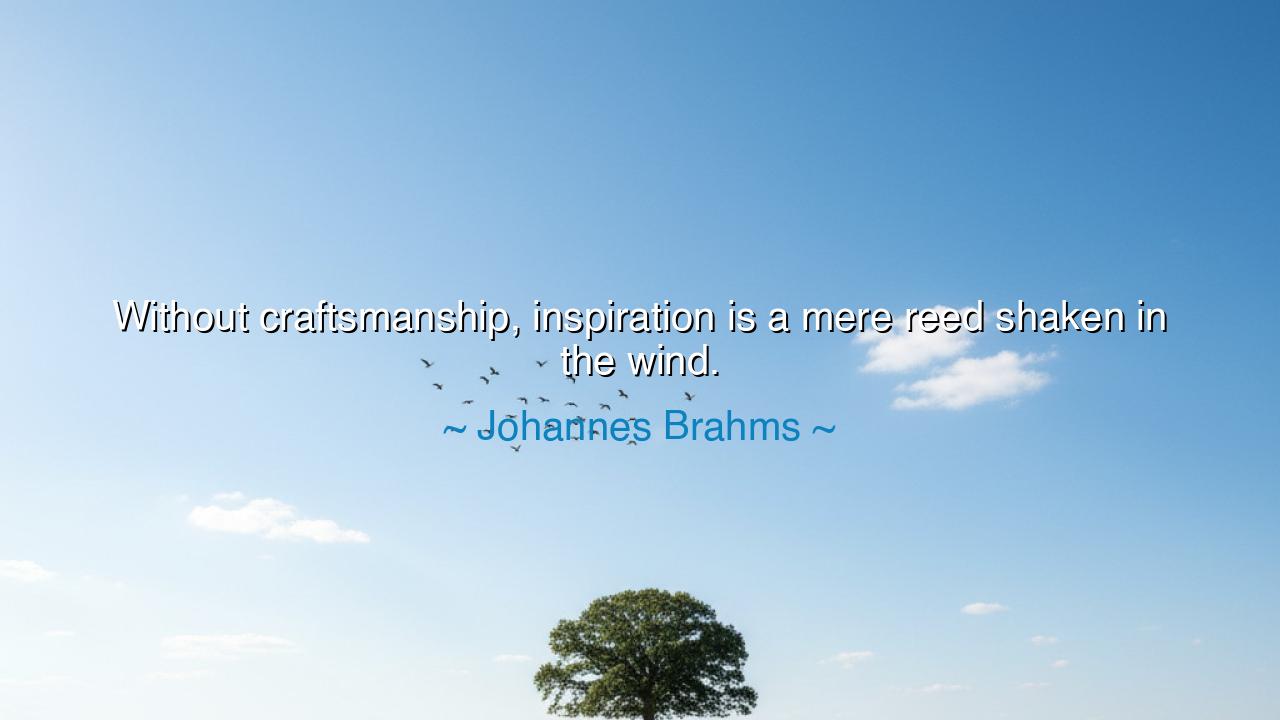
Without craftsmanship, inspiration is a mere reed shaken in the






“Without craftsmanship, inspiration is a mere reed shaken in the wind.” — so spoke Johannes Brahms, the master composer whose soul was both fire and discipline, passion and precision. His words are not only for musicians but for all who seek to create, to build, or to give form to the unseen. In this saying lies an eternal law of creation: inspiration may ignite the flame, but craftsmanship sustains it. The dream alone is wind and motion; the skill of the hands and mind gives it form, purpose, and endurance.
Brahms lived in an age of giants — following in the footsteps of Beethoven and standing among the great romantics who sought to translate the human spirit into sound. Yet he understood what many forget: that genius is not a flash of light, but a forge of labor. His compositions, though filled with divine beauty, were born from endless hours of study, correction, and refinement. He once said he destroyed more music than he kept, for he believed that true art demanded discipline equal to inspiration. Thus, when he spoke of the “reed shaken in the wind,” he meant that inspiration without mastery is fragile — easily swayed, soon forgotten. Only through craftsmanship does the artist anchor the wind and turn sound into song, vision into legacy.
In the language of the ancients, Brahms’ wisdom echoes an old truth: the gods may grant fire, but man must learn to shape it. The Greeks told of Hephaestus, the divine craftsman, who forged beauty out of flame and metal. Even divine inspiration, they believed, required the hand of skill. So too does Brahms remind us that the muse’s gift, though divine, is powerless without the human hand trained to receive it. Craftsmanship is the vessel that holds the inspiration, the earth that gives root to the sky’s lightning. Without it, creation scatters — a gust of brilliance that vanishes into silence.
Consider the story of Leonardo da Vinci, that tireless soul who married genius with method. His notebooks overflow with sketches, equations, and endless studies of motion, light, and form. He drew the same hand hundreds of times, seeking not the perfection of inspiration but the perfection of mastery. The world remembers him not because he dreamed, but because he labored to bring his dreams into flesh and stone. His “Mona Lisa” is not merely inspiration captured — it is the harmony of passion and precision, spirit and structure. Leonardo’s life proves Brahms’ truth: that inspiration without skill is fleeting, but when joined with discipline, it becomes immortal.
This saying also speaks to the modern soul, which too often worships the spark and neglects the craft. We live in a time that prizes instant creation, quick success, effortless genius — yet Brahms whispers across the ages that enduring greatness is born only through effort. The poet must master his meter, the writer his language, the painter his brush, the worker his tools. The dreamer who refuses discipline becomes, like the reed, shaken and directionless. But the one who tempers passion with patience becomes the maker of worlds.
There is also a moral truth within Brahms’ words. Craftsmanship is not only technical skill but also integrity — the commitment to excellence even when no one watches, the humility to learn, the endurance to fail and rise again. It is the devotion that turns inspiration into service, transforming fleeting emotion into something that uplifts others. The true craftsman does not chase the applause of the moment; he seeks to build something that will outlive him. Inspiration gives the spark — craftsmanship keeps the flame alive through the long night of labor.
So, my child, remember this teaching: inspiration is sacred, but without craftsmanship it is barren. When the muse visits you, do not merely rejoice — work. Hone your skill as a warrior hones his blade. Study the masters, practice daily, and bring the light of your vision into the material world. Let your hands obey your heart. In time, your labor will transform the fragile reed of inspiration into a strong and resonant instrument — one through which the winds of heaven may sing.
Thus, as Brahms teaches, do not wait for greatness — build it. For the divine whisper is given to many, but only the craftsman turns it into song. Inspiration passes like the breeze, but craftsmanship endures like the stone temples of the ancients, standing firm against time, carrying beauty from one age to another. Learn, labor, and create — and the world will know not the fleeting wind, but the enduring music of your soul.






AAdministratorAdministrator
Welcome, honored guests. Please leave a comment, we will respond soon